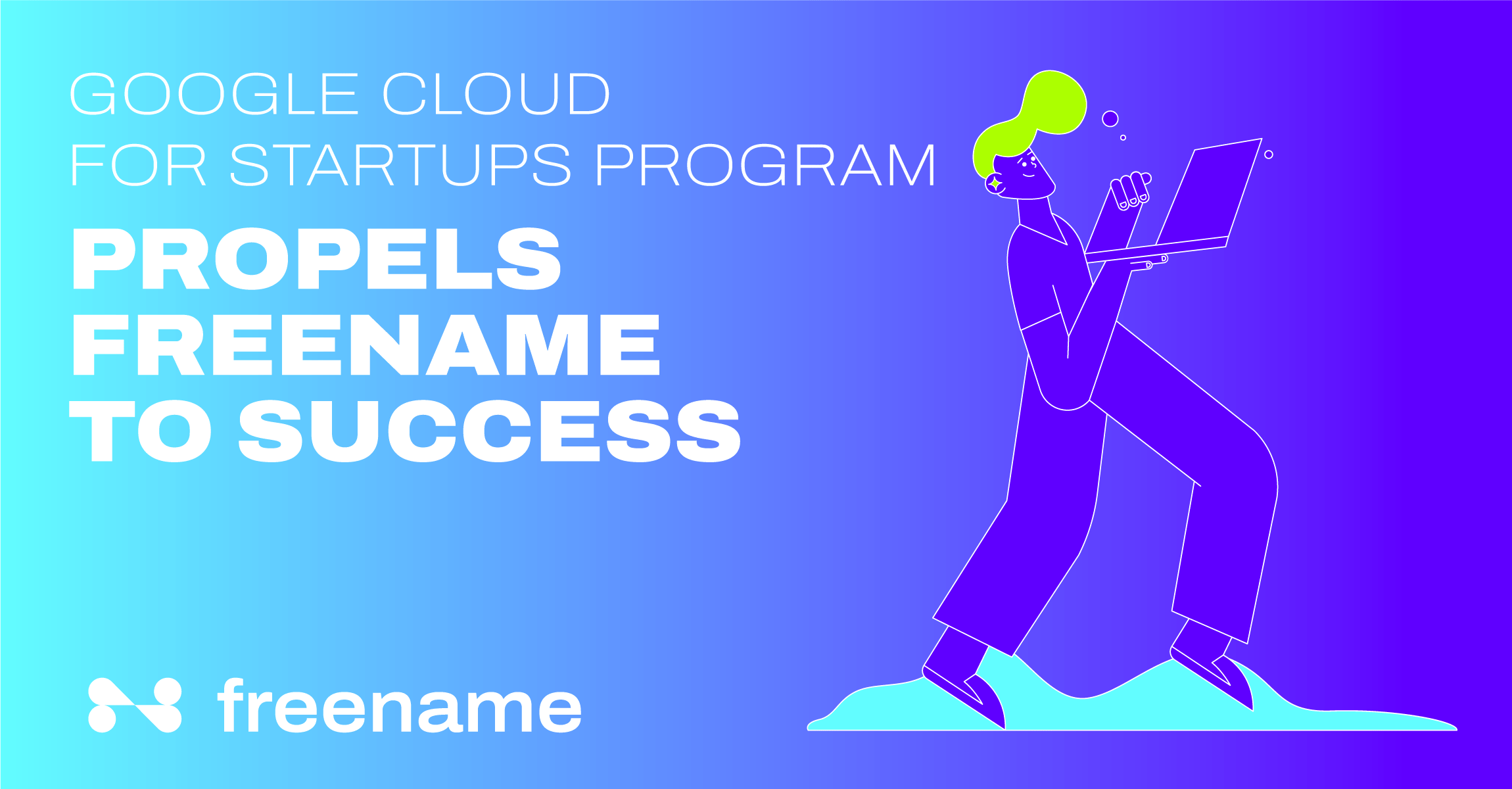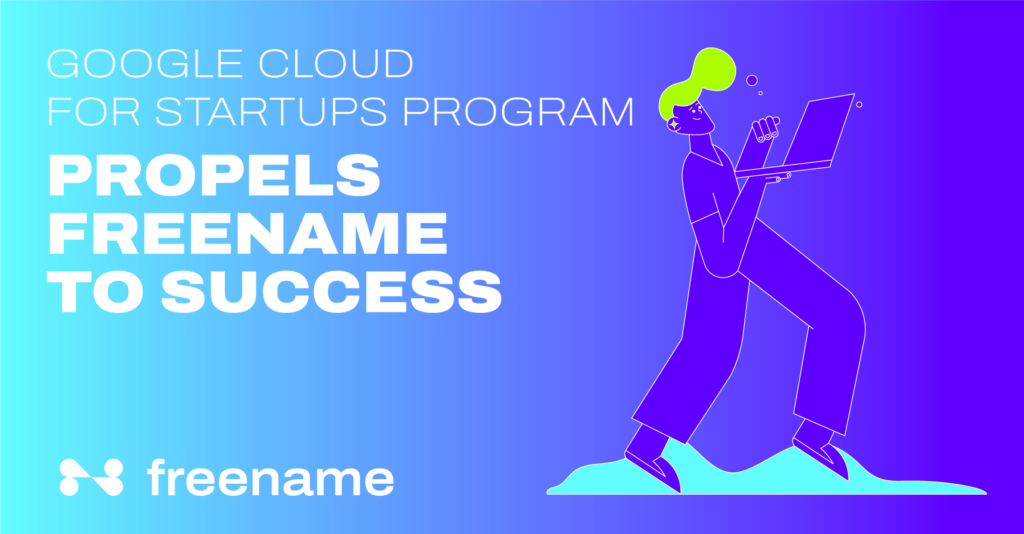Google For Startups Cloud Program Propels Freename to Success
Google for Startups Cloud Program is now available: It aims to assist innovative companies by providing them with access to products, programs, and the support of experts. The program offers coverage of up to $100,000, equivalent to 20% of costs, for Google Cloud services for all investor-backed start-ups through Series A rounds in their first year.
In addition to participating in free training events, workshops, and courses, participating start-ups will have access to mentorship services. The program aims to help start-ups progress rapidly from the start to avoid potential technical delays that could hinder their growth later on.
Find an introduction by Google here.
The Revolution of Google for Startups Cloud Program
The startup cloud program revolution is in full swing as more companies migrate to cloud-based solutions. This trend is not just limited to traditional businesses; for digital natives, the cloud is no longer a differentiator. The ability to extract value from it is what sets them apart.
To fully realize the potential of the cloud, companies must focus on building a robust and cost-efficient infrastructure. For example, it should enable agile workflows while also being flexible enough to incorporate new technologies and solutions in a simple and effective manner. Only then can they achieve market success and maintain a competitive edge in terms of innovation and speed.
Freename’s Benefit of Google for Startup Cloud Program
These are some of the areas that the program has been helpful:
- Predictive ability
- Operational excellence
- Continuous innovation
Predictive ability
Digital native companies have vast data at their fingertips, spread across various SaaS tools and applications. However, as businesses continue to collect more data, democratizing access to this information has become crucial. Therefore, integrating data into operational workflows is now essential for developing better products and increasing customer satisfaction.
But this is just the beginning. Google’s highly innovative cloud system goes beyond just data integration. It allows digital native companies to make decisions based on high-quality predictive insights. This is thanks to its significant investments in Artificial Intelligence and Machine Learning (ML).
Google has made ML the central paradigm under which all of its products are built. Examples include Google Photos, Google Ads Search Suggestions, and Gmail Smart Replies. The vision is to democratize AI, making the same solutions that Google uses daily for its business accessible to DNBs.
By leveraging Google’s powerful ML tools, DNBs can unlock the true value of their data and gain deeper insights into their business operations. This will enable them to make more informed decisions, improve their products and services, and ultimately gain a significant competitive advantage in the market.
Operational excellence
As we know, in today’s market, both quality and speed of market presence are essential for digital-native brands (and not only) to outcompete their rivals.
However, resource allocation and workload management can often pose a challenge. Frequently, teams find themselves preoccupied with fixing issues instead of focusing on product optimization and creation.
Google’s Cloud infrastructure caters to the needs of digital natives by enabling them to concentrate on their core business rather than troubleshooting. By using tools specifically designed for containerization and microservices, the time spent on maintenance can be redirected toward product development, significantly reducing overall costs.
Moreover, the cloud business model is naturally “elastic” and on-demand. Still, Google Cloud goes a step further by employing an open and transparent pricing model, thus further enhancing the potential for operational excellence.
Continuous innovation
Google Cloud offers a comprehensive infrastructure that empowers digital native brands to leverage the full potential of scalability, portability, and efficiency. With Google Cloud, Digital Native Brands (DNBs) have access to a vast network of partners and open-source, multi-cloud, and hybrid cloud solutions that enable them to collaborate and innovate at an unprecedented level.
DNBs can utilize Google Cloud’s technological openness to utilize data and run applications on diverse technologies, driving continuous innovation. By incorporating cutting-edge solutions, DNBs can stay ahead of the competition and improve their market positioning.
Moreover, Google Cloud’s collaborative ecosystem facilitates seamless integration with other platforms and services, providing DNBs with greater flexibility and customization options. This streamlined approach enables DNBs to focus on their core competencies and business objectives, optimizing their resources and achieving maximum efficiency.
By embracing Google Cloud’s advanced infrastructure, digitally native brands can unlock limitless possibilities for growth and success, transforming how they do business and revolutionizing their industry.
What Startups are on Google for Startups Cloud Program?

If you are interested in knowing some of the notable companies that are already in the Google for Startups Cloud program, these companies have been discussed and analyzed below.
Paypal
Paypal partnered with Google Cloud Platform (GCP) in 2018 to move 15% of their infrastructure to the public cloud for rapid scalability without the overheads of proprietary infrastructure. Google’s presence in over 200 countries/regions made them a suitable partner for Paypal. The migration started with a trial of software development, and after initial success, more business units and infrastructure migrated. Paypal engineers now work alongside GCP engineers to build solutions that match the scale and value of Paypal’s services.
Home Depot
Home Depot, the world’s largest home improvement company, initially relied on in-house data warehousing for inventory, turnover, and analytics. As data analysis became more complex and in-house infrastructure restructuring failed to keep up with capacity, the company switched to Google Cloud’s scalable, serverless Big Query. The rollover resulted in significant reductions across data analyses, including supply chain, customer orders, and store performance dashboard use.
Shopify
Shopify is a cloud-based webshop system that offers comprehensive opportunities for sellers to succeed online. With over 600,000 active users and a Gross Merchandise Value of over 82 billion USD, Shopify is a popular and valuable shopping system worldwide.
The platform operates on Shopify’s servers, offering effortless handling for E-commerce beginners and a monthly fee depending on the version. Shopify’s App and Theme Store provide valuable plugins and shop designs, with over 2,200 apps available, making it one of the world’s most comprehensive platforms for third-party offers in E-commerce.
Freename.io
Freename, a startup that offers innovative naming solutions, has been invited by Google to join its Cloud Startups Program. This program is designed to provide startups with access to products, programs, and best practices, along with support from Google experts.
As part of the program, Freename will receive coverage equivalent to 20% of costs, up to $100,000, for using Google Cloud services during their first year. Additionally, they will have access to mentorship services, workshops, courses, and free training events. Being a part of this program will allow Freename to incorporate new technologies and solutions in a simple and effective way, giving them a competitive edge in the market.
Conclusion
The Google for Startup Cloud Program offers innovative companies a chance to access Google Cloud services, expert support, mentorship, workshops, and training events. By participating in this program, startups can progress quickly and avoid potential technical obstacles that could hinder their growth.
The program aims to assist startups in utilizing the scalability, portability, and efficiency of Google Cloud infrastructure while also benefiting from its open and transparent pricing model. This makes it an excellent opportunity for native digital brands to optimize their operations and achieve operational excellence.

Latest News:



How Web3 Gaming Is Growing And Shaping The Future









